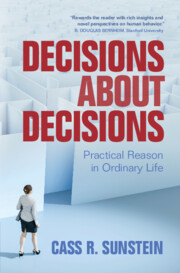Book contents
- Decisions about Decisions
- Decisions about Decisions
- Copyright page
- Contents
- Tables
- Preface
- 1 Second-Order Decisions
- 2 Deciding to Opt
- 3 Deciding to Know
- 4 Deciding to Believe, 1
- 5 Deciding to Believe, 2
- 6 Deciding Inconsistently
- 7 Deciding to Consume, 1
- 8 Deciding to Consume, 2
- 9 Deciding by Algorithm
- 10 Deciding for Oneself
- Epilogue “Get Drunk!”
- Acknowledgments
- Index
6 - Deciding Inconsistently
Published online by Cambridge University Press: 29 June 2023
- Decisions about Decisions
- Decisions about Decisions
- Copyright page
- Contents
- Tables
- Preface
- 1 Second-Order Decisions
- 2 Deciding to Opt
- 3 Deciding to Know
- 4 Deciding to Believe, 1
- 5 Deciding to Believe, 2
- 6 Deciding Inconsistently
- 7 Deciding to Consume, 1
- 8 Deciding to Consume, 2
- 9 Deciding by Algorithm
- 10 Deciding for Oneself
- Epilogue “Get Drunk!”
- Acknowledgments
- Index
Summary
In important contexts, people prefer option A to option B when they evaluate the two separately, but prefer option B to option A when they evaluate the two jointly. In consumer behavior, politics, and law, such preference reversals present serious puzzles about rationality and behavioral biases. They are often a product of the pervasive problem of evaluability. Some important characteristics of options are difficult or impossible to assess in separate evaluation, and hence choosers disregard or downplay them; those characteristics are much easier to assess in joint evaluation, where they might be decisive. But in joint evaluation, certain characteristics of options may receive excessive weight, because they do not much affect peoples actual experience or because the particular contrast between joint options distorts people’s judgments. In joint as well as separate evaluation, people are subject to manipulation, though for different reasons. It follows that neither mode of evaluation is reliable. The appropriate approach will vary depending on the goal of the task – increasing consumer welfare, preventing discrimination, achieving optimal deterrence, or something else. Under appropriate circumstances, global evaluation would be much better, but it is often not feasible.
- Type
- Chapter
- Information
- Decisions about DecisionsPractical Reason in Ordinary Life, pp. 96 - 122Publisher: Cambridge University PressPrint publication year: 2023



